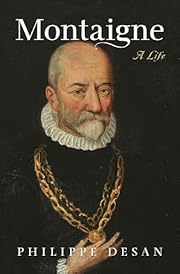

Click on a thumbnail to go to Google Books.
|
Loading... Montaigne: a life (2014)by Philippe Desan
 None No current Talk conversations about this book. Exhaustively comprehensive, this book gives more about Montaigne than the casual reader needs. It also requires some knowledge of the labyrinthine course of French history during the wars of religion. Montaigne, himself, remains elusive. How did this provincial nobleman evolve to produce a text of such novelty and wisdom? no reviews | add a review
"One of the most important writers and thinkers of the Renaissance, Michel de Montaigne (1533-92) helped invent a literary genre that seemed more modern than anything that had come before. But did he do it, as he suggests in his Essays, by retreating to his chateau, turning his back on the world, and stoically detaching himself from his violent times? In this definitive biography, Philippe Desan, one of the world's leading authorities on Montaigne, overturns this longstanding myth by showing that Montaigne was constantly concerned with realizing his political ambitions--and that the literary and philosophical character of the Essays largely depends on them. The most comprehensive and authoritative biography of Montaigne yet written, this sweeping narrative offers a fascinating new picture of his life and work. As Desan shows, Montaigne always considered himself a political figure and he conceived of each edition of the Essays as an indispensable prerequisite to the next stage of his public career. He lived through eight civil wars, successfully lobbied to be raised to the nobility, and served as mayor of Bordeaux, special ambassador, and negotiator between Henry III and Henry of Navarre. It was only toward the very end of Montaigne's life, after his political failure, that he took refuge in literature. But, even then, it was his political experience that enabled him to find the right tone for his genre. In this indispensable biography, we discover a new Montaigne--caught up in the events of his time, making no separation between private and public life, and guided by strategy first in his words and silences. Neither candid nor transparent, but also not yielding to the cynicism of his age, this Montaigne lends a new depth to the Montaigne of literary legend"-- No library descriptions found. |
Current DiscussionsNonePopular covers
 Google Books — Loading... Google Books — Loading...GenresMelvil Decimal System (DDC)844.3Literature French & related literatures French essays Renaissance 1500–1600LC ClassificationRatingAverage: (3.8) (3.8)
Is this you?Become a LibraryThing Author. |
||||||||||||||||||||||||||||||||||||||||||||||||||||||||||||||||||||||||||||||||||||||||||||||||||||||||||||||||||||||||
Although Montaigne’s tower was soon built – complete with chapel, bedroom and library – he did not immediately become the reclusive author of legend. Certainly, he spent some of the ensuing decade writing a work published in 1580 as the Essays (later greatly expanded). He also forged a new career as emissary and negotiator in the Wars of Religion that were tearing France apart. Recommended to the king (Charles IX) by a powerful Guyenne neighbour (Gaston de Foix), whose château was just 20 kilometres away, Montaigne was made Knight of the Order of St Michael. It was a huge social leap. Unusually, he also became Gentleman of the Chamber of the great pretender to the throne, the Protestant Henri de Navarre (later Henri IV). Montaigne was a go-between, valued by both sides.
Read the rest of the review at HistoryToday.com.
Neil Kenny is Senior Research Fellow at All Souls College, Oxford. His books include Death and Tenses: Posthumous Presence in Early Modern France (Oxford, 2015).